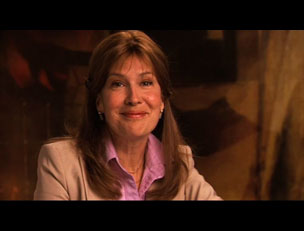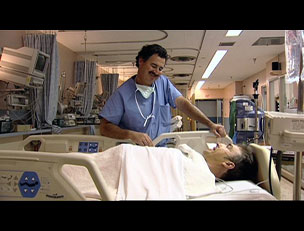Returning the Human Touch to High-Tech Care


To view the health interests video, you need the free Macromedia Flash Player, version 6 or higher. Get it now.


To view the health interests video, you need the free Macromedia Flash Player, version 6 or higher. Get it now.
The New Medicine – a two-hour documentary that premiered March 29 on PBS (check local listings for future broadcasts) – explores a burgeoning movement taking place in hospitals and clinics across the country: integrating the best of high-tech medicine with a new attitude that recognizes it is essential to the healing process to treat the patient as a whole person, and not a cog in an assembly line.
The New Medicine suggests that medical practice in America may be on the brink of a transformation. As scientific findings reveal that the mind plays a critical role in the body’s capacity to heal, the medical community has begun to integrate this new understanding into effective treatment strategies that take Western medicine to the next level.
Hosted by Dana Reeve, who was diagnosed with lung cancer following the death of her husband Christopher, The New Medicine goes inside medical schools, healthcare clinics, research institutions and private practices to show physicians at work on the cutting edge of this new approach. By paying attention to a person’s cultural values and lifestyle, stresses and supports, these doctors acknowledge the important role that the patient can and should play in their own healing and healthcare.
The New Medicine explores why even some of the most conservative health institutions are now prescribing meditation and self-hypnosis alongside high-tech modern medicine. “With brain imaging, with molecular biology, cell biology, physiology, we can put all of the pieces of the puzzle together, which we certainly couldn’t do even just a few decades ago,” says renowned researcher, rheumatologist and author Dr. Esther Sternberg.
Until recently, scientists viewed the connection between the mind and the body’s response to disease with skepticism, so what a patient was feeling had little relevance to healthcare. But, today, thanks to sophisticated new research, the complex biology of how the mind interacts with the body is becoming clearer, and physicians are discovering how something as intangible as hope can help people heal and something as pervasive as stress can sabotage the body’s ability to fight infection.
The New Medicine introduces viewers to some patients who are benefiting from these exciting breakthroughs:
- Tammy lies in a hospital bed at one of America’s leading teaching hospitals, at risk of losing her pre-term baby. Despite all the best that high-tech medicine has to offer her, what may actually save her baby’s life? Relaxation therapy to address the complex biochemical link between stress, the immune system and illness.
- Michael is listening to a soothing voice on a visualization tape that helps him to feel positive about his upcoming back surgery and speed his recovery. The source of this New Age-sounding tape? His insurance company, Blue Shield of California
- Matthew has cerebral palsy. He has lived his entire 18 years with unremitting and sometimes excruciating pain. What new therapy has his doctor introduced to provide relief and enable him to attend college next year on his own? Self-hypnosis to dial down the pain.
- At 56, Bill Fink has had multiple heart attacks and a number of life-saving interventions including triple and quadruple bypasses. While high tech medicine has done a good job of keeping Fink alive, it has done a poor job of keeping him healthy. But now, in a program at the Scripps Center for Integrative Medicine, he is learning to develop a lifestyle that will keep him out of the operating room – attending lectures on the functioning of the heart, working out in an exercise program, learning to buy and cook healthy food, attending support groups and stress management classes, taking classes in music, yoga and spirituality, and more.
The New Medicine explores the need for medicine to move away from an entrenched culture of drugs and surgery to focus more on prevention and engaging people as active players in their own healthcare. The program also reveals that medical education is also changing in response to these needs. The show takes viewers to Drexel University College of Medicine in Philadelphia, one of a growing number of medical schools where there is renewed emphasis on teaching some of the skills of pre-modern medicine — the importance of listening, comforting, and encouraging the body’s own healing abilities.
The traditional doctor-patient relationship is undergoing a shift from paternalism to partnership, as practitioners and consumers alike have begun to promote a more holistic form of healthcare called integrative medicine—seeking to heal the whole person, rather than simply cure a disease.
In addition to the show, The New Medicine: Companion Book to the Public Television Series, with forward by Dana Reeve, includes in-depth interviews with physicians and research scientists featured in the program, as well as tips on how to choose the best doctor and how to get the most out of your visit. It is available at www.atlasbooks.com ($14.95 plus shipping and handling).
